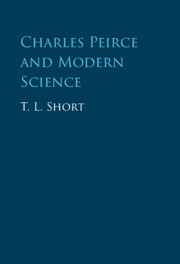Book contents
- Charles Peirce and Modern Science
- Charles Peirce and Modern Science
- Copyright page
- Dedication
- Contents
- Preface
- Acknowledgments
- A Note on Citation of Sources
- Chapter 1 Peirce’s Life in Science: 1859–1891
- Chapter 2 Peirce’s Concept of Science
- Chapter 3 Modern Science Contra Classical Philosophy
- Chapter 4 The Meaning of Pragmatism
- Chapter 5 Misleading Appearances of System
- Chapter 6 Devolution of the Cosmogonic Program
- Chapter 7 Experiments Expanding Empiricism
- Chapter 8 Phaneroscopy and Realism
- Chapter 9 Normative Science
- Chapter 10 Modern Science Contra Modernity
- Bibliography
- Index
Chapter 9 - Normative Science
Published online by Cambridge University Press: 26 October 2022
- Charles Peirce and Modern Science
- Charles Peirce and Modern Science
- Copyright page
- Dedication
- Contents
- Preface
- Acknowledgments
- A Note on Citation of Sources
- Chapter 1 Peirce’s Life in Science: 1859–1891
- Chapter 2 Peirce’s Concept of Science
- Chapter 3 Modern Science Contra Classical Philosophy
- Chapter 4 The Meaning of Pragmatism
- Chapter 5 Misleading Appearances of System
- Chapter 6 Devolution of the Cosmogonic Program
- Chapter 7 Experiments Expanding Empiricism
- Chapter 8 Phaneroscopy and Realism
- Chapter 9 Normative Science
- Chapter 10 Modern Science Contra Modernity
- Bibliography
- Index
Summary
Peirce’s concept of science entails that normative judgment in science, about which types of theory or explanation or evidence, etc., are good, must depend on the evidence provided by the experience of inquiring (Chapter 2), a thesis supported by the history of science (Chapter 3). This implies a method, at once empirical and normative, which Peirce’s late sketch of a trio of ’normative sciences’ (aesthetics, ethics, logic) generalizes and rationalizes. Its generalization is supported by Peirce’s expansion of empiricism (Chapter 7), and its rationalization depends on the rediscovery of final causation (Chapter 6). Although sketchy, Peirce’s idea of normative sciences is important; for its plausibility undermines that most pernicious of dichotomies, of fact and value. This chapter explicates Peirce’s idea of normative science, traces its method from Schiller’s aesthetics through Kant’s ethics, and suggests that the rediscovery of final causation corrects what is most problematic in Kant’s metaphysics of morals, viz., its anti-naturalism.
Keywords
- Type
- Chapter
- Information
- Charles Peirce and Modern Science , pp. 218 - 251Publisher: Cambridge University PressPrint publication year: 2022

